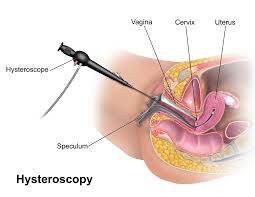Experience cutting-edge hysteroscopy surgery at Dr. Ankita’s Fertility Center in Mumbai. Our skilled team offers safe, precise diagnosis and treatment for gynecological conditions, ensuring personalized care and optimal outcomes for every patient. Trust us for advanced fertility solutions and compassionate support on your journey to parenthood.

Why Opt for Hysteroscopy Surgery?
Hysteroscopy surgery is chosen for several reasons, primarily to diagnose and treat issues within the uterus. Here’s why it’s opted for:
- Diagnostic purposes: Hysteroscopy allows doctors to visually inspect the inside of the uterus using a thin, lighted instrument called a hysteroscope. It helps diagnose conditions such as abnormal bleeding, repeated miscarriages, or unexplained pelvic pain.
- Treatment of abnormalities: During hysteroscopy, doctors can simultaneously treat certain uterine abnormalities. For example, they can remove polyps (non-cancerous growths), fibroids (non-cancerous tumors), or adhesions (scar tissue) that may be causing symptoms or fertility problems.
- Minimal invasiveness: Compared to traditional open surgery, hysteroscopy is minimally invasive. It is usually performed as an outpatient procedure, meaning no overnight hospital stay is required. Recovery time is generally shorter, and the risk of complications is lower.
- Fertility enhancement: For women experiencing infertility, hysteroscopy can help identify and remove any intrauterine issues that may be hindering conception. By correcting these issues, fertility may improve.
- Customized treatment: Hysteroscopy allows for a targeted approach to treatment. Surgeons can precisely locate and address specific problems within the uterus, leading to more effective outcomes.
- Safety profile: Hysteroscopy is considered safe for most women, with minimal risk of complications. Serious complications are rare when the procedure is performed by a skilled healthcare provider in a proper medical setting.
- Alternative to more invasive procedures: In some cases, hysteroscopy can serve as an alternative to more invasive surgical procedures, such as hysterectomy (removal of the uterus). It offers a conservative treatment option while still addressing certain uterine issues.
The Procedure of Hysteroscopy Surgery
The hysteroscopy procedure involves the following steps:
Preparation: Before the procedure, the patient may receive instructions to fast for a certain period and to empty their bladder. They may also be given medications to help relax or to prevent infection.
Anesthesia: Hysteroscopy can be performed under local anesthesia with sedation or general anesthesia. Depending on the patient’s preference and the complexity of the procedure.
Insertion of the hysteroscope: After adequately sedating or anesthetizing the patient, the doctor inserts a hysteroscope into the vagina, guiding it into the uterus. This thin, lighted tube has a camera at its end, enabling visualization of the uterus on a monitor.


